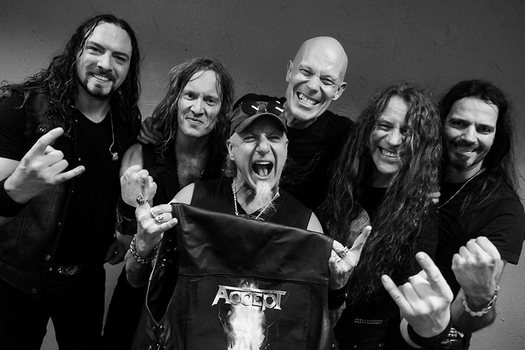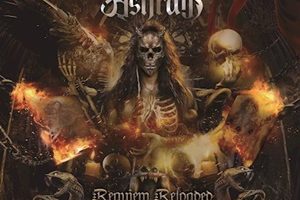Accept – Relevant Past, Present, and Future
Sunday, 3rd January 2021
The Accept train keeps on moving. Five albums deep into their resurrection starting with Blood of the Nations back in 2010, these gentlemen keep the pedal to the metal, never stopping in their quest to deliver steady anthems. Too Mean to Die as the latest effort contains a great mix of heart-pumping material, including a ballad with “The Best Is Yet to Come”, sinister mid-tempo numbers like “The Undertaker”, and a closing instrumental with “Samson and Delilah” that has tons of catchy hooks and layers of guitar finesse to uncover. We grabbed guitarist Wolf Hoffman for another chat to catch up on the expanded lineup as a sextet, the behind the scenes work for “The Undertaker” video, management changes, thoughts on success today versus the past, and also delve a bit into why Wolf will never be writing an autobiography.
Dead Rhetoric: The Accept lineup in 2020 has a balance between Americans and Germans currently. Do you find in today’s marketplace it’s better to find the right musicians for friendship and chemistry sake, no matter where they are located – versus having to be in the same location geographically pre-internet times?
Wolf Hoffman: Ideally we would all live in the same place and be in the same neighborhood. That’s how it was forty years ago but reality is, most bands nowadays have musicians from all over the place, including us. And that’s fine. We have a bunch of Germans, one guy lives in Germany, I live in Florida currently, some of us live in Nashville, Mark currently lives in New Jersey, we are from all over the place. And it’s fine, we get together and do our thing and it’s working out great.
Dead Rhetoric: Expanding to a sextet with three guitarists, do you believe this will open up certain horizons especially in terms of musical interplay and harmonies?
Hoffman: Absolutely. It already has, actually. We’ve done a bunch of shows with this new lineup, before the pandemic started and it went fantastic. We loved it.
Dead Rhetoric: Too Mean to Die is the latest Accept album – what was the game plan when it came to the songwriting and recording for this effort? Were there specific elements you wanted to emphasize this time around, or is it more a case of continuing to churn out the trademark aspects of the Accept sound?
Hoffman: You cannot ever write an album and have a plan before you start. Basically you let the songs flow the way they come and you end up picking out the best ones. It’s really hard to have a grand vision, at least we’ve never done it. Maybe some other bands do it that way, but we’ve never written a concept album or we’ve never had a grand scheme. You never go and say, ‘we need three fast songs and then two slow songs’, this and that. This is just a formula, I don’t think it works that way. Just see what works together in the end.
There’s no grand master plan, ever.
Dead Rhetoric: I was actually very pleased to hear the final instrumental “Samson and Delilah”, was that intentionally developed as an instrumental?
Hoffman: Yes. I just again, I had the idea and it was there. It was Andy (Sneap) who pushed for that song to be on the album, it didn’t need to be there. We could have left it off and been fine with ten songs on there, and we could have had another song with vocals. He liked that instrumental piece, and we thought it made the album a little more multi-faceted and sort of a nice outro for the whole album. It could have been on one of my solo albums as well, it didn’t have to be on this album.
In general with the way we write songs, I let the music flow and record everything that comes to mind when doing the demo phase. It’s a wide variety of stuff that never sees the light of day. But a lot of it does, and it’s bad to limit yourself beforehand. Basically just jam with myself, and I record everything. Sometimes crazy choruses or crazy riffs, anything. I don’t think about it too much in the beginning. Then there comes a time where you judge the stuff that you’ve done, and Andy comes to table to go through all the ideas and as songs develop they feel like Accept.
Dead Rhetoric: Were there any songs this time that seemed more difficult or challenging than others?
Hoffman: The first song “Zombie Apocalypse” for some reason was really hard. It took several attempts, where a song like “The Undertaker” was easy, and came together in one or two tries. Some of these songs go through so many revisions, and then some songs never make it. You try and you try, and you are never happy. It’s different every time.
Dead Rhetoric: What can you tell us about the video shoot for “The Undertaker” – as it seems like a great visual clip experience, and has received over 750,000 views on YouTube alone already?
Hoffman: Has it really? Wow! I’m not even up to snuff on that, that’s good. The song was determined to be the single, and we sent it to a production company or video producer that our manager knew, and they came up with the concept. Obviously when you are talking about the undertaker, it needs to be about that- they had a great idea about making the undertaker dance with the dead body and I loved the way it was executed. It was shot in Poland actually, in a deserted castle. Our scenes were shot in Nashville at a civil war cemetery. We wanted it to look as if it had been in the same location but it was shot in two different continents.
Dead Rhetoric: What was the thought process behind the artwork this time around?
Hoffman: We knew we wanted the album to be called Too Mean to Die because it fit the times that we live in, these crazy coronavirus times. We just wanted to make a metal statement, in your face, but not too serious because obviously no one is too mean to die. It felt good and sounded like the right light-hearted response to these crazy lock down times. When we had that title, we wanted to figure out how to represent it visually. Gaby our manager until recently and my wife still, she came up with the idea about a snake – somehow we found something we liked and gave it to our digital artist and converted it into this metal, mean looking creature. We wanted something iconic and simple this time. We’ve had good luck with that in the past – Blood of the Nations we had the two fingers, Objection Overruled with two fists, and Metal Heart with the heart.
Dead Rhetoric: Last year you released the “Life’s a Bitch” single to tide people over before the new album release. Do you still enjoy the physical medium of vinyl and issuing exclusive, limited edition releases like this for the ardent followers and collectors to get into?
Hoffman: Yeah, the fans really enjoy it. It’s about the fans to enjoy, and now you can come up with re-releasing cassette tapes. Believe it or not, they’ve decided to re-release a limited edition, 500 each, of our last five albums on tapes. I would have never thought I would see that again. Collectors really enjoy these different formats, I think it’s great.
Dead Rhetoric: Heavy metal as a genre is now 50 years young as I’d like to say. Does it ever surprise you the enduring quality the genre has, with the musicians as well as with the fans?
Hoffman: Absolutely. I never thought it would last this long. I’m glad that it did, I never expected it to be the case. I remember when I started as a teenager and joined Accept at 16 or 17, and then I thought it would go for a few years and then something else would come along. Grunge started to happen in the 90’s and I really thought we’ve had a good run, but heavy metal is over. It was another phase, like punk was or disco – it comes and goes. But here we are all these years later, and it’s still going strong. It definitely has more endurance than I ever thought it would have. I’m glad for it.
Dead Rhetoric: With so many records to now choose from when it comes to the Accept catalog when it comes to playing live, how much of a challenge is it to decide the ideal setlists to play live worldwide? Or are there certain territories in the world that have their particular Accept favorites?
Hoffman: Well, it’s a luxury problem to have. Too many songs to choose from, and that’s a good thing. At this point we could start thinking about phasing some of the old songs out in favor of some of the new ones. At the same time I’m thinking about the majority of the fans, when you think about an audience of maybe 1,000 people, there may be a few hardcore fans who have heard the old classics really often and are ready for something new, but I can’t really say that’s true for everybody. You try to please the majority of the fans, so we will always go back to some of the old stuff, and we probably will until the day we die. “Balls to the Wall”, “Fast as a Shark”, “Princess of the Dawn” – those are probably always going to stay in the setlist long-term, we try to keep a balance between the old stuff from the 80’s and the new phase of Accept.
We are almost at the point where we could exclusively play the new material and be fine, but I’m sure some people would miss things and complain.
Dead Rhetoric: Gaby your wife has stepped down from her management duties and you’ve signed on to Antje Lange/ Continental Concerts & Management. How do you feel about this change in the team, and discuss the importance of management for the band to work at their best creatively?
Hoffman: It’s more of an internal thing, I don’t think the average fan is going to notice any big difference. It’s under the hood stuff. Of course management is important and Gaby had a huge role in our career. It’s as much her band as it is for the rest of the guys. Without her, we wouldn’t be anywhere near where we are today. It’s really her work behind the scenes. The key word being, behind the scenes- she’s never been in the public eye, and goes quietly about her business in the background. It’s just a change of personnel. Antje has taken over for Gaby, and she’s more than capable of doing it.
Dead Rhetoric: Obviously with the coronavirus most of 2020 has been a lay low prospect for most musicians, especially when it comes to live touring and festival activities. How have you handled this downtime, and where do you see the state of the scene coming out of this during 2021?
Hoffman: Well, by making an album we spent the year quite well. Obviously we wish we could have gone on tour and do that parallel to the album release. I don’t know where it’s going to go. I hope we can play some of the summer festivals in the coming year, but I don’t really know more than anyone else does. We are all just waiting for the doors to open and concert touring to resume. I’m going to start working on some new classical ideas at some point, just try to stay busy and productive as much as I can.
Dead Rhetoric: What does success mean to you these days – and has that definition changed and evolved from your youth to today?
Hoffman: Good question. Yes it has changed. I remember in the 70’s and 80’s, it was all about selling albums. It was the touring was looked at as a way to support the album sales and generate album sales. There was always the idea that if you stayed on tour long enough and supported the album for a year, eventually you would break through and sell, five million albums. Those days are gone. Nobody sells five million albums anymore, at least not in the metal genre. Touring has taken the place as a main source of income now for all bands really. Live shows and merchandise and stuff gets generated on tour, and the albums sales are just a small piece of the puzzle.
How do you measure success then? Back in the day it was all about album sales. You sold ten million albums so you are twice as successful as the next act that sold five million albums. How do you do that nowadays? It’s more about where do you stand prestige-wise and how many tickets do you sell. And where do you stand in the eyes of the fans. So it’s a little bit harder to judge. Judging by all of that, I think we are doing phenomenal right now. Even though the rules have changed, I think now we are even more successful as we were back then.
Dead Rhetoric: Were you surprised when Peter Baltes stepped away from the band in 2018?
Hoffman: Yeah, I was. I was sad more than anything. I was a bit heartbroken to be honest. I wasn’t really surprised when it happened, I was more surprised how it happened. I thought we would have this big sit down and talk things over, convince him to stay. We could tell he really wasn’t in it anymore, his heart and soul, he wasn’t happy. It’s not a good situation when you are in a band where somebody isn’t happy. I don’t know what was going on, but in the end he sort of pulled the plug without giving us a chance to have that talk.
It’s almost two years since, we have a great new guy in the band and the train keeps rolling. The show goes on.
Dead Rhetoric: What’s on the horizon for Accept for 2021 and going into the following year? Would you ever consider writing an autobiography of your musical life?
Hoffman: Would not, short answer to that question. I’ll tell you why. I have no fun in poking around in the past. It’s painful for me to even talk about the previous albums in the past of the 70’s, 80’s and 90’s. It forced me to relive these moments. A lot of mixed stuff happens in a career, some of it good, some of it not so good. Going back at it is really never any fun for me. Let the past be the past, and let’s move on with the future. I wrote the song “The Best Is Yet to Come” for that reason, it’s my life philosophy. I don’t enjoy second guessing and reliving these old moments, all that kind of stuff. I find it not pleasant.
Touring hopefully. It will be a while before the fans can come to live shows, at least they have an album to enjoy. We will just have to wait and see. I may work on more personal music.




























